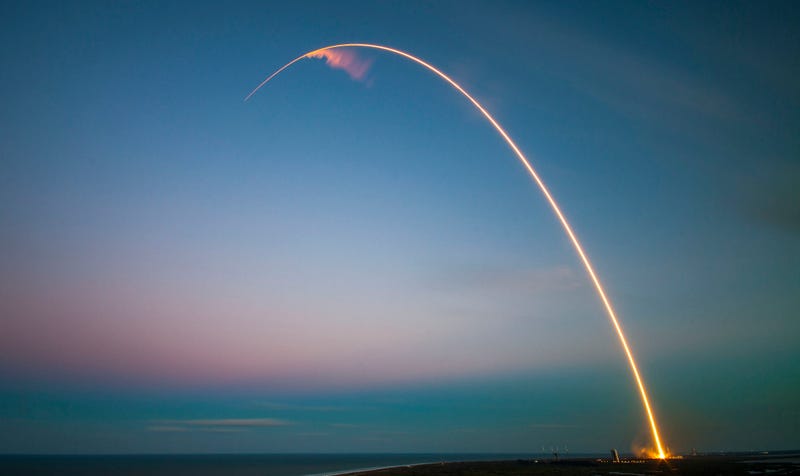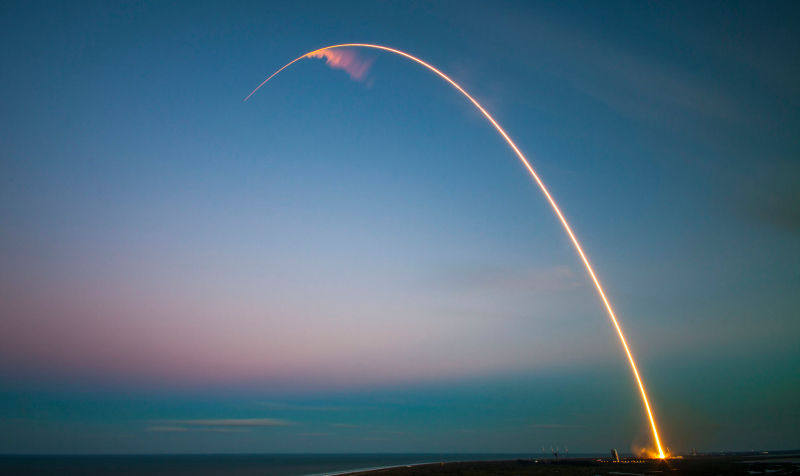
It’s an exciting time to be alive if you’re keen to watch humans get off this planet. A private space race is taking off, opening new pathways to orbit while sparking a burst of technological innovation. Even better, thanks to the magic of internet live streaming, we’re watching history unfold in real time.
Speaking of history—did you catch that SpaceX Falcon 9 rocket landing on a fucking ocean barge yesterday like it was no big deal? . Watch it again if you already did. It gets a little more awesome each time. Remember, you’re watching a forty meter-tall aluminum tank land softly on a giant autonomous raft minutes after separating from a payload (including an inflatable space habitat) in low Earth orbit.
A brave new future of reusable rockets is upon us. But what are the next big milestones for the private space industry? Here are five things to look forward to in the months and years ahead.
Advertisement
1. Actually re-using reusable rockets
Sending a rocket into orbit and bringing it back to Earth is a huge accomplishment. But what good’s a reusable rocket unless you start, well, re-using it? Musk has already decided that his first “reusable” Falcon 9 will be a museum piece, although SpaceX did test fire the engines after the rocket landed, and things seemed to check out. The rocket could probably fly again. It’s unclear what SpaceX plans to do with its latest space veteran—although if I had to guess, I’d wager they’re going to try to launch it again.
Blue Origin, Jeff Bezos’ private space tourism company, has also made huge strides toward reusable rockets. Last week, the notoriously tight-lipped rocket company brought a New Shepherd rocket to the edge of space and back for the third time in a beautiful, control descent.
Sponsored
2. Building lots and lots more rockets
SpaceX isn’t busting its ass on reusable rockets to haul NASA’s luggage to the ISS every six months: it wants to blast all kinds of stuff into orbit for all kinds of customers, and it’s already got launch requests up the whazoo. To meet them, the company is cranking up Falcon 9 production big time, from six to eight rocket cores per year to over thirty, according to SpaceX COO Gwynne Shotwell. Likewise, we can expect other private space companies to accelerate rocket production once they’re ready for prime time.
3. Bigger and badder rockets
Later this year, SpaceX plans to debut the Falcon Heavy, which will, according to the rocket company, “be the most powerful operational rocket by a factor of two.” The rocket is specifically designed to ferry astronauts into orbit, and eventually, to Mars. We can’t wait to see this thing in action.
4. Flying astronauts to space
Speaking of humans—right now, if you’re an astronaut who’d like to get to the ISS, Russia’s Soyuz spacecraft is the only game in town at the moment. But that could change very soon: last year, NASA has granted commercial crew contracts to SpaceX and Boeing. Per the contracts, each company will send anywhere from one to six crewed flights into orbit, beginning as early as next year. Before that happens, both companies need to complete a rigorous certification process and assure NASA that their spacecraft have adequate safety measures in place. Orbital ATK and Sierra Nevada were also recently contracted by NASA to ferry supplies, and perhaps an extra astronaut, to the ISS.
5. Space tourism
While SpaceX, Boeing, Orbital ATK, and Sierra Nevada are all chasing government contracts to take supplies and personnel up to the ISS, some companies have their sights set on a different audience: people willing to pay bank to fly into suborbital space. After a setback two years ago when its SpaceShipTwo crashed, Richard Branson’s Virgin Galactic has been working hard to get back on track, unveiling the VSS Unity earlier this year. But Blue Origin might be the first to open up the space tourism market: earlier this year, the company announced its intentions to begin flying private citizens as early as 2018.
Advertisement
6. Going to MARS!
Of course, we all know Elon Musk’s end game here—colonizing Mars! The billionaire tech entrepreneur has made his feelings on this matter clear: “I think the wise move is to make life multiplanetary while we can,” Musk told a huge crowd of scientists and space enthusiasts at the American Geophysical Union annual meeting last December.
Still, it’s going to take some time. While NASA has spent the last year doing its darnedest to convince everybody it’s got a journey to Mars in the works for the 2030s, the space agency’s actual plans remain nebulous. As private rocket companies continue to break new ground, it’s looking more and more likely that any crewed journey to Mars will be a public-private partnership.
SpaceX has hinted that it’ll be unveiling its own roadmap for Martian settlement—and perhaps more details on how we’re going to terraform the Red Planet?—later this year, so stay tuned.











